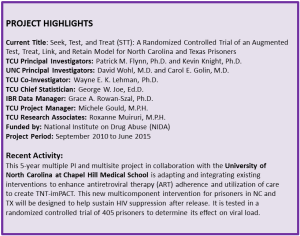HIV-infected prisoners after their release have a relatively high potential to transmit their virus. Incarceration provides opportunities to identify and treat HIV and most prisons provide effective HIV care.

There is a need for comprehensive services post release to ensure that persistent suppression of HIV viremia and reduced propensity to transmit HIV are achieved. The purpose of this project is to determine if a comprehensive intervention results in a significant reduction in the potential for HIV-infected prisoners to transmit their virus after release. The study is being conducted in prisons in North Carolina (NC) and Texas (TX) which collectively represent 15% of all persons in U.S. state prisons.
Specifically, we have adapted and integrated existing interventions [i.e., Participating and Communicating Together (PACT), a multicomponent motivational interviewing (MI)-based ART adherence intervention; Motivating Change, a cognitive mapping-based intervention to improve engagement and participation in health care following prison release; and CONNECT, a needs assessment and HIV care linkage program] to form a new intervention for HIV+ prisoners who have achieved suppression of viremia during incarceration to encourage engagement in HIV care and treatment after release, enhance adherence to HIV therapy, sustain suppression of HIV, reduce infectiousness, and maintain health. This new intervention is being compared with standard care in a sample of over 400 prisoners to determine its impact on viral load 24 weeks following release from prison. Secondary outcomes, including post-release HIV transmission risk behaviors, incident STIs, adherence to ART, medical care appointments, emergence of ART resistance mutations, and predicted HIV transmission events will be described and modeled.
This research represents one of the largest and most rigorous studies of risk behavior among a cohort of HIV-infected releasees ever undertaken. Among others, innovations include the use of celluar phones to deliver Motivational Interviewing sessions post-release, to conduct unannounced pill counts, and deliver audio files and text messages including tailored reminders regarding ART dosing and HIV-related clinic appointments following release. The proposal addresses a highly significant public health issue with potential to greatly advance the US HIV prevention agenda by delivering and testing a comprehensive intervention to sustain HIV viral suppression.
To date, participants have been recruited from over 25 prisons and state jails. In Texas we have successfully recruited over 200 participants.